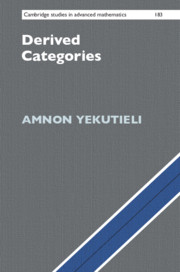Book contents
- Frontmatter
- Dedication
- Contents
- 0 Introduction
- 1 Basic Facts on Categories
- 2 Abelian Categories and Additive Functors
- 3 Differential Graded Algebra
- 4 Translations and Standard Triangles
- 5 Triangulated Categories and Functors
- 6 Localization of Categories
- 7 The Derived Category D(A,M)
- 8 Derived Functors
- 9 DG and Triangulated Bifunctors
- 10 Resolving Subcategories of K(A,M)
- 11 Existence of Resolutions
- 12 Adjunctions, Equivalences and Cohomological Dimension
- 13 Dualizing Complexes over Commutative Rings
- 14 Perfect and Tilting DG Modules over NC DG Rings
- 15 Algebraically Graded Noncommutative Rings
- 16 Derived Torsion over NC Graded Rings
- 17 Balanced Dualizing Complexes over NC Graded Rings
- 18 Rigid Noncommutative Dualizing Complexes
- References
- Index
14 - Perfect and Tilting DG Modules over NC DG Rings
Published online by Cambridge University Press: 15 November 2019
- Frontmatter
- Dedication
- Contents
- 0 Introduction
- 1 Basic Facts on Categories
- 2 Abelian Categories and Additive Functors
- 3 Differential Graded Algebra
- 4 Translations and Standard Triangles
- 5 Triangulated Categories and Functors
- 6 Localization of Categories
- 7 The Derived Category D(A,M)
- 8 Derived Functors
- 9 DG and Triangulated Bifunctors
- 10 Resolving Subcategories of K(A,M)
- 11 Existence of Resolutions
- 12 Adjunctions, Equivalences and Cohomological Dimension
- 13 Dualizing Complexes over Commutative Rings
- 14 Perfect and Tilting DG Modules over NC DG Rings
- 15 Algebraically Graded Noncommutative Rings
- 16 Derived Torsion over NC Graded Rings
- 17 Balanced Dualizing Complexes over NC Graded Rings
- 18 Rigid Noncommutative Dualizing Complexes
- References
- Index
Summary
We begin with a study of algebraically perfect DG modules over a NC (noncommutative) DG ring A. There is a theorem giving several conditions on a DG A-module L that are equivalent to being algebraically perfect; one of them is that L is a compact object of D(A). When A is a ring, we prove that L is algebraically perfect iff it is isomorphic, in D(A), to a bounded complex of finitely generated projective A-modules. In Section 14.2 we prove a general Derived Morita Theorem.From Section 14.3 to the end of this chapter we assume that the DG rings in question are K-flat over the base ring. Section 14.3 contains some basic constructions of derived functors between categories of DG bimodules. Next, in Section 14.4, we define tilting DG bimodules. Among other results, we prove that a DG B-A-bimodule T is tilting iff T is a compact generator on the B side and it has the NC derived Morita property on the B side. We also prove the Rickard--Keller Theorem.
In Section 14.5 we introduce the NC derived Picard group of a ring A. The structure of this group is calculated when A is either local or commutative.
- Type
- Chapter
- Information
- Derived Categories , pp. 373 - 423Publisher: Cambridge University PressPrint publication year: 2019

